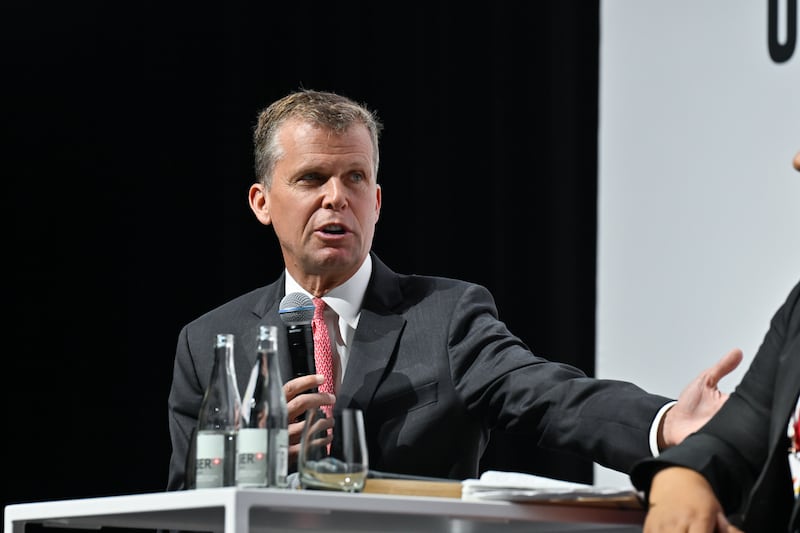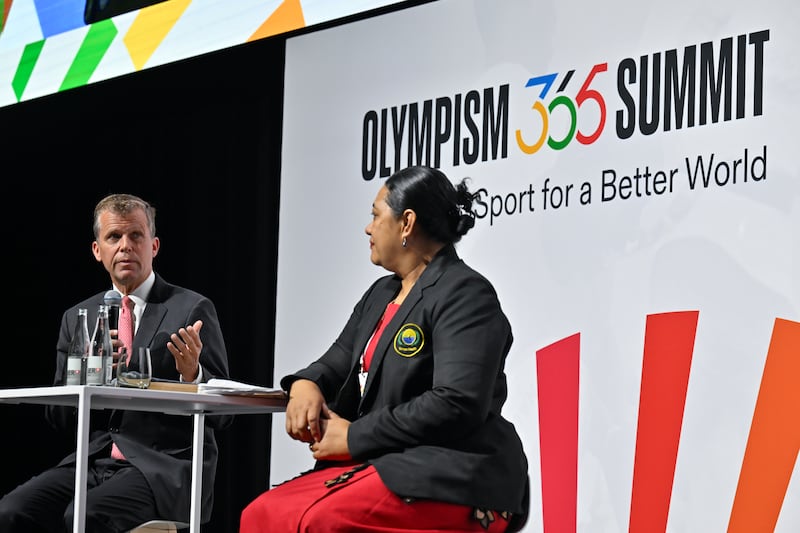For Huntsman Family Foundation CEO David Huntsman, hosting the 2034 Winter Games in Utah is an opportunity to improve the support available to athletes around the world for their mental health.
“If there’s one thing that’s true, the Olympic movement has always had great power to do big things, to do hard things, to do difficult things,” Huntsman said during a panel discussion at the International Olympic Committee’s first-ever Olympism 365 Summit in Switzerland.
“That, ultimately, is the legacy of the Olympics, beyond just the Games and the competing for medals. Legacy is defined by doing something impactful that’s sustained over a long period of time,” he said.
The big, hard, difficult thing he wants from the 2034 Winter Games?
Providing mental health care to athletes at all levels in all places, a goal that was warmly received at the two-day summit focused on “Building a Better World through Sport” that concluded Thursday.

Huntsman said “that truly can be the legacy that we leave behind after the Closing Ceremonies are over with that continues to benefit people and society, and in our communities, long after the Games are over with.”
The moderator of the “Safer Sport and Safer Communities through Sport, Health Protection and Promotion” discussion, Ana Jelušić Black, encouraged his efforts. At 15, the three-time Olympic alpine skier from Croatia was the youngest competitor at the 2002 Winter Games in Utah.
“I wish you all the luck with that,” she said as the audience applauded.
A Utah Olympic organizer says athlete mental health ‘critical’
In the audience was Catherine Raney Norman, vice president of Development and Athlete Services for the 2034 Winter Games organizing committee and a four-time Olympic speedskater who also competed in 2002.
It was “a powerful moment for Utah to be represented by the Huntsman Family Foundation and the meaningful work they are leading in the mental health space,” she told the Deseret News, calling mental health “a critical component of every athlete’s journey.”
Utah’s Olympic organizers “are proud to work alongside the Huntsman Mental Health Institute to help ensure that all athletes have access to the support and resources they need, on and off the field of play," Raney Norman said.
She said the initiative could be a game-changer.
“The collaboration between Salt Lake City-Utah 2034, the Huntsman Mental Health Institute, and the International Olympic Committee in the lead-up to the 2034 Games has the potential to reshape how the global Olympic and Paralympic community supports mental health in sport,” Raney Norman said.
How athletes can help normalize mental health
Huntsman, who shared the stage with the CEO of the Tonga Health Promotion Foundation, Ofeina Filimoehala, described how his family gave $150 million to the University of Utah in 2019 to establish the Huntsman Mental Health Institute, the largest private gift of its kind at the time.
“I’m not a mental health expert. I’m not a health care professional. But as president of a large foundation, I recognize that mental health is our generational challenge,” he said, adding, “Our goal is nothing less than to change the way we think about mental health.”
The foundation made up entirely of Huntsman family members recognized that what had been done in the past wasn’t working, he said, given that the numbers of people suffering were growing exponentially.

“Something needed to be done,” Huntsman said. “What our hope and what our aspiration is, is that we can normalize mental health. That we don’t think about it as some sub-category of our overall health, that we see it inseparably connected to our physical health.”
When an athlete has a physical injury, he said “they’ll find the best doctor, they’ll get X-rays, they’ll get care to make sure that they heal sufficiently. But when somebody suffers from anxiety or from depression or from trauma, too often they don’t seek the help they need.
“There’s still shame, there’s embarrassment, there’s pain associated with suffering from mental health. The stigma is very strong and that has to change. Mental health is not a moral failing, it’s not a character flaw, it’s not something that somebody does wrong to bring upon themselves.”
Huntsman recounted how 15 years ago, he lost his older sister to “a terrible, violent death of despair. She struggled with mental health issues her whole life. As a family, we never talked about it. We missed an opportunity.”
Sports can play a role in opening up those conversations, he said, citing the many athletes who have shared their own stories, such as U.S. Olympic gymnast Simone Biles, who made headlines when she withdrew from competing at the Tokyo Olympics in 2021 to protect her mental health.
“It makes all the difference in the world,” Huntsman said.
“Athletes in many cases are afforded a platform and a profile and a status in society where they’re looked up to and they’re respected,” he said. “When they have the strength to come and talk about their experiences and their struggles, it makes it easier for others.”
What needs to happen between now and 2034
Huntsman said even though the state’s second Winter Games are still nearly nine years away, “we need to be thinking now, and we need to be making preparations now to build a foundation to be able to support our athletes.”
It will take bringing in “the best minds, the best researchers, the best scientists, the best clinicians, to be able to build the knowledge and the expertise and the best practices so we can give our athletes the support they need,” he said.
What they come up with needs to be scalable, Huntsman said, “so it’s not only applicably locally, but then we could apply it nationally and internationally in a way that works for all the various communities” as well as everyone who aspires to compete at any level.
“No matter where they live, where they come from, what their background is,” he said there should be access to “the resources and the tools to deal with this very difficult and complex challenge that faces so many people.”
Huntsman told the Deseret News he welcomed the invitation to speak at the summit, which featured leaders from around the world, including the director general of the World Health Organization, Dr. Tedros Adhanom Ghebreyesus.
“With our family’s dedication and passion to break down barriers and end the stigma associated with mental health challenges, we will always embrace the chance for dialogue on a global stage,” Huntsman said in a statement.
“We know that the Olympic and Paralympic Games provide an incredible opportunity to broaden the message around mental health research, treatment, healing and hope through these incredible athletes sharing their stories,” he said.
The foundation, Huntsman said, wants “to support these athletes and their families and we also want to encourage local leaders throughout the world to make mental health a priority for their communities.”


